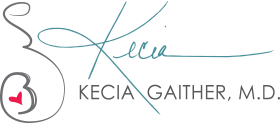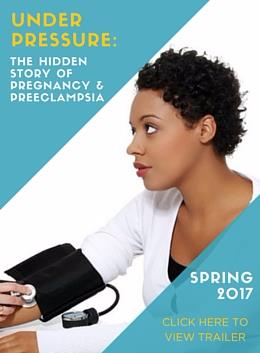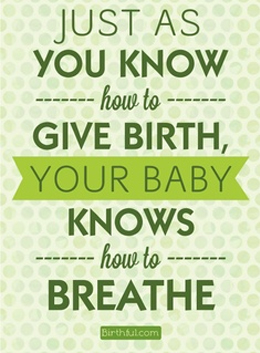September is National PCOS Awareness Month. What is PCOS, you say? In other words, polycystic ovary syndrome. I know what you’re thinking: “I don’t have PCOS.” But how do you know? And what’s it like to have PCOS?
Almost 7 million women in the United States have PCOS — and less than half realize they do. “PCOS is an endocrine disorder affecting women of reproductive age; in the U.S., it is estimated that 1:10-1:20 women may be impacted by the disease,” Dr. Kecia Gaither, MD, a double board-certified physician in OB/GYN and Maternal Fetal Medicine, tells Bustle. “The exact cause of PCOS is unknown, however, a genetic basis may be involved, as most women affected have close degree family members — like a sister, mother or aunt — with the same disease.”
Scary, right? Though it doesn’t have to be. Usually, doctors look for at least two of the following symptoms before they diagnose someone with PCOS, according to the Mayo Clinic: irregular periods (i.e., everything from if cycles are more than 35 days apart to getting less than eight periods a year), excess androgen (i.e., facial and body hair in atypical places, acne, and male-pattern baldness), and polycystic ovaries (i.e., when ovaries are enlarged and contain small fluid-like sacs around the eggs). PCOS can also cause weight gain, infertility, and an increased risk of diabetes and heart disease. In addition, someone with it may have elevated glucose and/or blood pressure and weight gain around the middle, says Dr. Nieca Goldberg, Medical Director of the Joan H. Tisch Center for Women’s Health at the New York University Langone Medical Center and author of Dr. Nieca Goldberg’s Complete Guide to Women’s Health, in an email to Bustle.
If you suspect you have PCOS, an evaluation by a gynecologist and endocrinologist should be done, she says. “It can be treated with metformin, a medication that is used to lower blood sugar and may also help with fertility,” Dr. Goldberg says.
As you will see below, PCOS affects different women in different ways. Some find out they have it through genetics, after an immediate family member is diagnosed, while others have typical symptoms and others don’t. Here’s what it’s like to have PCOS, according to 11 Bustle readers.
It Could Be Hereditary
1. Paige, 34
2. Clair, 24
It makes my period more painful, but that can be tempered with birth control. That can, of course, mess with my hormones and make me unable to enjoy my social or sexual life at times. The one concern is that it will be an issue when I start having children, so I’m trying to be extra diligent about preventative care to stave off the chance of infertility.
I recommend everyone get examined by a gynecologist every year and be very forthcoming with pain you experience, especially if it’s isolated to one side and extends beyond your period. You’d go to the doctor to treat any other part of your body, so why not your ovaries?
3. Melissa, 34
Ignoring something because you don’t want kids anyway or overly focusing on fertility and not your whole being can let the side effects of this fall through the cracks. I had a doctor that assured me I could still have kids, but failed to mention why it is important to have a period in the meantime. I ended up with early hyperplasia, which can be pre-cancerous. Knowing the risks and what to watch out for is important, and a plan to move forward is necessary.
Common Symptoms To Watch Out For:
1. Cassie, 28
They prescribed medications — Provera and metformin, which is a type 2 diabetic drug. (How is that supposed to help an infertility disorder?!) Provera made my chest horribly sore and sometimes my breasts would leak, and it also increased my PCOS chin hair! So at 26, I decided to go the holistic way. I stopped those meds and started incorporating my own natural female balance from the health food store, like plant-based female hormones which regulated me on my own.
Every day is a struggle and it strains every relationship a PCOS woman tries to have, for the sheer fact of the horrible mood swings. You can get discoloration and bumps on your chest, armpits, or back of the neck. I got them on the back of my neck. They come and go, itch, and look unflattering. I got the Teal Ribbon, the color for PCOS, on the back of my neck to disguise them.
2. Jessica, 24
Also, I have made some major changes in my diet recently (no gluten, soy, dairy, sugar), which makes it hard when going out with friends. Plus, having PCOS makes it easier for you to get type 2 diabetes. You need to monitor your health to make sure that doesn’t happen. Also, there are so many ways you can combat PCOS in your daily life (diet, exercise, medicine) to lessen the symptoms and it really does make a real difference.
3. Lindsey, 27
Another way it has affected my life is in relationships. It never exactly gets easy telling your partner that you’re “not sure” whether or not you can have a child. Because I’m not at the point where I’m wanting to have a baby just yet, I live in a lot of ambiguity in terms of childbirth. No one can tell me exactly whether or not I will be able to get pregnant — so I often live in this vague place where I consider both adoption or IVF or not having a child at all. My partners (present and past) have all been supportive, but there are times when I’m not in a great mood or feeling sorry for myself, and PCOS does make me feel like “less of a woman.” With testosterone levels as high as mine, I do feel like I sometimes emote a masculine energy — and that has played a role in my sexuality, as well.
4. Aimee, 24
I think having PCOS has definitely influenced me to want to settle down sooner. When I was younger, I thought I’d have kids at a later age, like 35. Now I’d like to start trying to have kids at 29 or 30, because I fear I won’t be able to if I’m older. While there’s no cure for PCOS, there are ways doctors can help with symptoms — and the sooner you know, the sooner they can treat you.
5. Kelley, 26
The doctor did not have any idea what was going on, which made me so angry. He suggested I go see an endocrinologist. I started doing research on my own and came across polycystic ovarian syndrome. I seemed to have a lot of the symptoms associated with the disorder — weight gain, acne, depression, anxiety, and excess hair on the body where women normally do not see hair (my chin and stomach). When I finally went to the endocrinologist in January, it was confirmed I was suffering from this disorder.
I still constantly struggle with my weight that I gained with this syndrome, which to me is the most frustrating part about this disease. … I want people to realize they cannot judge someone by the way that they look. Most people do not know the struggle that some people face on a daily basis trying to feel somewhat normal in this world.
Unexpected Factors To Watch Out For
1. Angela, 40, MS, RD, LDN, PCOS Nutrition Center
2. Kristin, 29
3. Merica, 25
There’s plenty of support available for people with PCOS, both online and in person. “After I was diagnosed and experienced the frustration of trying to find credible information and a supportive environment of women who understood what I was going through, I started SoulCysters.net,” Kat Carney, Founder of SoulCysters.net, tells Bustle.
“To date, there are over 100,000 members on the free site,” Carney says. “The experience of having PCOS, and founding SoulCysters, inspired me to go into consumer health journalism — three years after my diagnosis, I became the medical anchor for CNN-HLN. While I was initially on medication for my PCOS, I have been able to completely manage my symptoms with lifestyle changes. I currently work with a nutritionist and work out regularly. My eating, rest, and physical activity are critical to staying symptom-free.”






